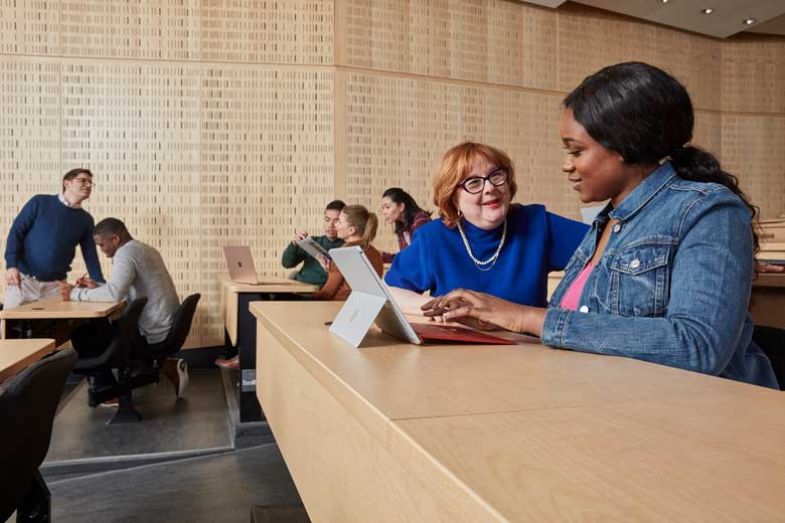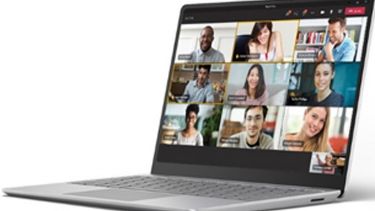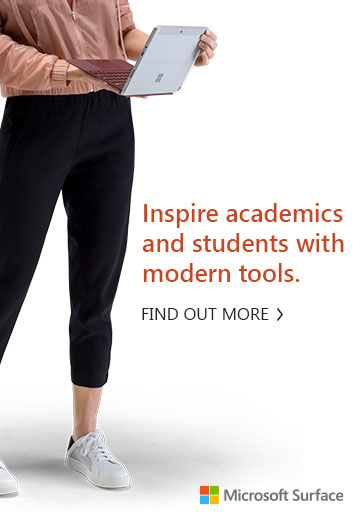
With the Covid-19 pandemic accelerating higher education’s digital transformation, institutions are now seeing the benefits of online learning – and its potential to augment the teaching experience
Not that long ago, the hot topic in the higher education sector was digital strategy and why higher education establishments needed one in place to tackle issues of siloed data and modernising legacy IT systems before working towards a new model of hybrid learning.
Even if a hybrid approach of online and in-person teaching had been rolled out at many institutions, it was often talked about in the future tense. There was innovation – even basic technologies such as lecture capture were advancing the concept – but then Covid-19 arrived, and no matter what stage universities were at in their digital transformations, they had to shift lessons online, often within weeks, in some cases within days.
Chris Rothwell, director of education at Microsoft UK, describes it as a “crash course” that has accelerated digital transformation across the industry. There is no going back. “People have had to do the taste test,” Mr Rothwell says. “They are seeing the benefits, and some of them are quite significant. Once people have started, they get committed and convinced that this is quite helpful. The ability to share, the ability to collaborate, to teach in different ways begins to come to life.”
The institutions that work with Microsoft are each at their own stage of digital evolution. Mr Rothwell sees pockets of innovation happening at every higher education institution in the UK, and such innovation inspires other advances in best practice. More novel are institutions such as the University of Central Lancashire (Uclan), which already had a digital transformation strategy in place that focused on teaching, learning and assessment. “Uclan have really thought about a whole-university approach,” Mr Rothwell says. “They have really made progress as an entire university, rather than just a department on its own, doing its own thing.”
James Crooks, director of learning and information services at Uclan, says the university was in a “great position” going into March 2020. Its digital transformation process had undergone more than two years of practical evolution before experiencing the ultimate stress test with the pandemic.
Microsoft technologies lie at the heart of Uclan’s model. Faculty members were given a Microsoft Surface device, crucial training and appropriate incentives to incorporate this technology into their teaching. Uclan’s DigiLearn programme uses the Microsoft Teams platform to offer a framework for faculty to share their experiences and insights, with awards for best digital practice.
While there was a steep learning curve for faculty, the DigiLearn programme made extending the digital transformation across campus a lot easier. “When we had to make our rapid shift entirely online in March, there was a huge effort required of the IT team, but thankfully the burden of all the help and support for staff didn’t all automatically come straight to them,” Mr Crooks says. “There was already a community of practitioners out there who could provide peer support.”
Kevan Williams, Uclan’s technology-enabled learning and teaching manager, says this practice-focused community approach is crucial for sharing excellence and allowing best practice to be implemented across the institution. “For us, it is all about taking a practice-informed approach of where technology genuinely adds value to our students’ learning experience,” he says. “Getting them involved in that community of practice was a fundamental part of the whole development of our digital transformation.”
Uclan’s strategic approach to digital transformation is broken into three areas: investment in people; investment in physical space; and investment in practice – the act of engaging with technology and exploiting it fully across our physical and digital environments. “Those three elements, from a teaching and learning point of view, are the things that we want to develop and enhance,” Mr Williams says.
As for physical space, there are ultimately difficult questions to be asked about large lecture theatres. In the new model, they could be less of an asset, albeit invaluable if an institution books a guest lecturer for an event. At Uclan, classrooms have been adapted to incorporate Microsoft Surface devices, streamlining the workflow for academics. “You would arrive in class, you would dock the Surface, you would have power, projection and wireless connectivity if you want to work with students instead of standing at the front and teaching at students,” Mr Williams says. “You could make it far more engaging and interactive.”
With a well-executed digital transformation strategy, institutions can allocate resources more effectively. There was a time when students might have booked a counselling session when what they really needed was to speak to someone in the finance office about how they could address money concerns. Mr Rothwell sees innovation coming in the form of AI-informed customer service technologies that intuit a student’s needs and advise them accordingly. These make for small, appreciable gains in the student experience.
Universities cannot ignore the customer service aspect of digital transformation. Whether they’re on campus or working remotely, students – not to mention staff – have certain expectations of an institution’s digital capability and experience. “They are turning up to university, inherently shaped by their interactions in the digital world, and then are a little bit confused sometimes that that is not available to them as part of their university life,” Mr Rothwell says.
Any digital transformation must make provisions for students from all backgrounds. Mr Williams explains that accessibility is a core component of all Uclan’s staff and student development programmes, from working closely with Microsoft to embed British Sign Language support across its synchronous digital learning platforms, to ensuring that students have the devices they need to participate. Uclan has distributed nearly 900 laptops to students in particular need and has invested in 4G wireless dongles to ensure that all its students can access the internet when off campus.
If Covid-19 was a stress test, Uclan’s digital transformation will continue as planned post-pandemic. “We have lots of laboratories, workshops, lots of practical, hands-on learning, and we are looking at ways of adapting those facilities so that they can be accessed more effectively online,” Mr Crooks says. “The digital transformation is about providing that platform, an environment which is supportive and allows creativity and innovation across our different academic teams.” And, he adds, it is a process without end.
Learn how Microsoft can enhance the campus experience and empower your faculty.
Find out more about Microsoft Surface for business.








